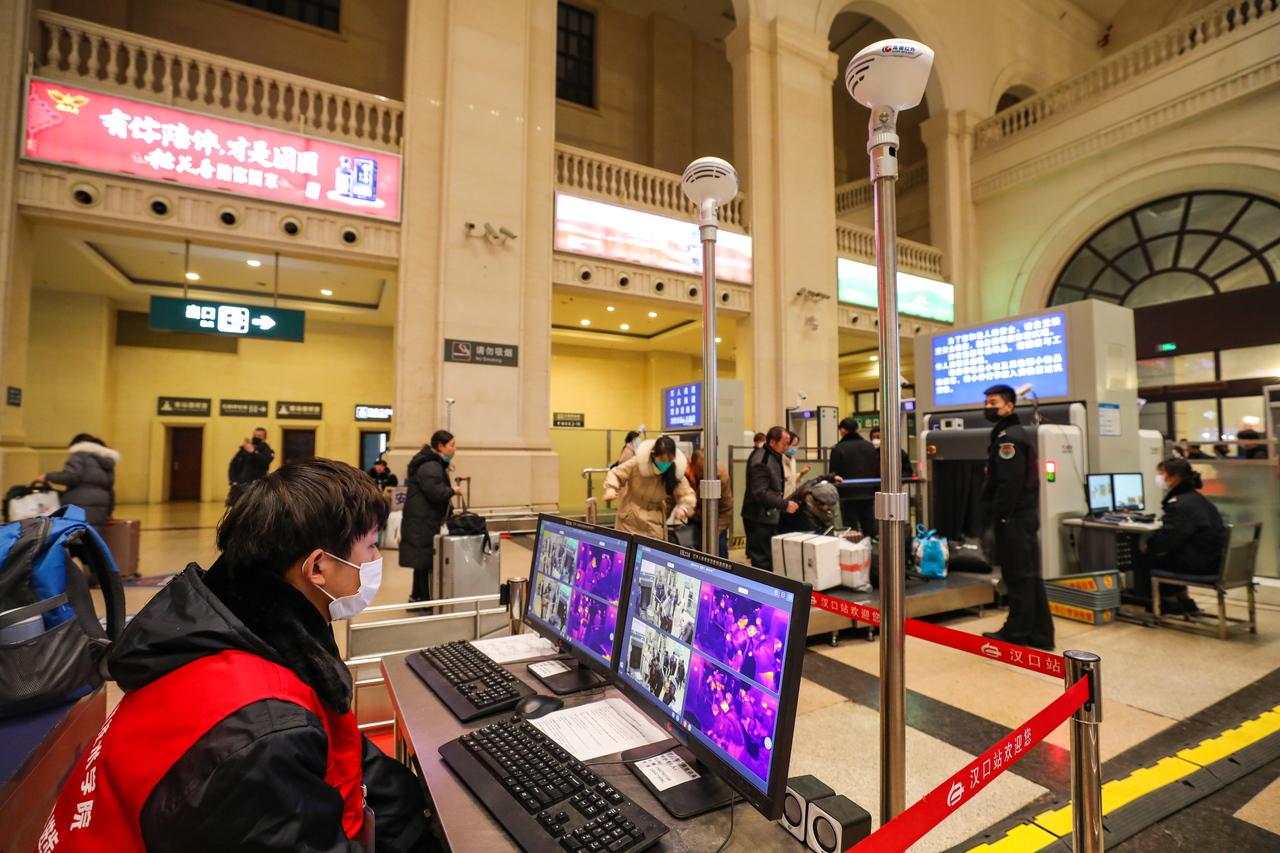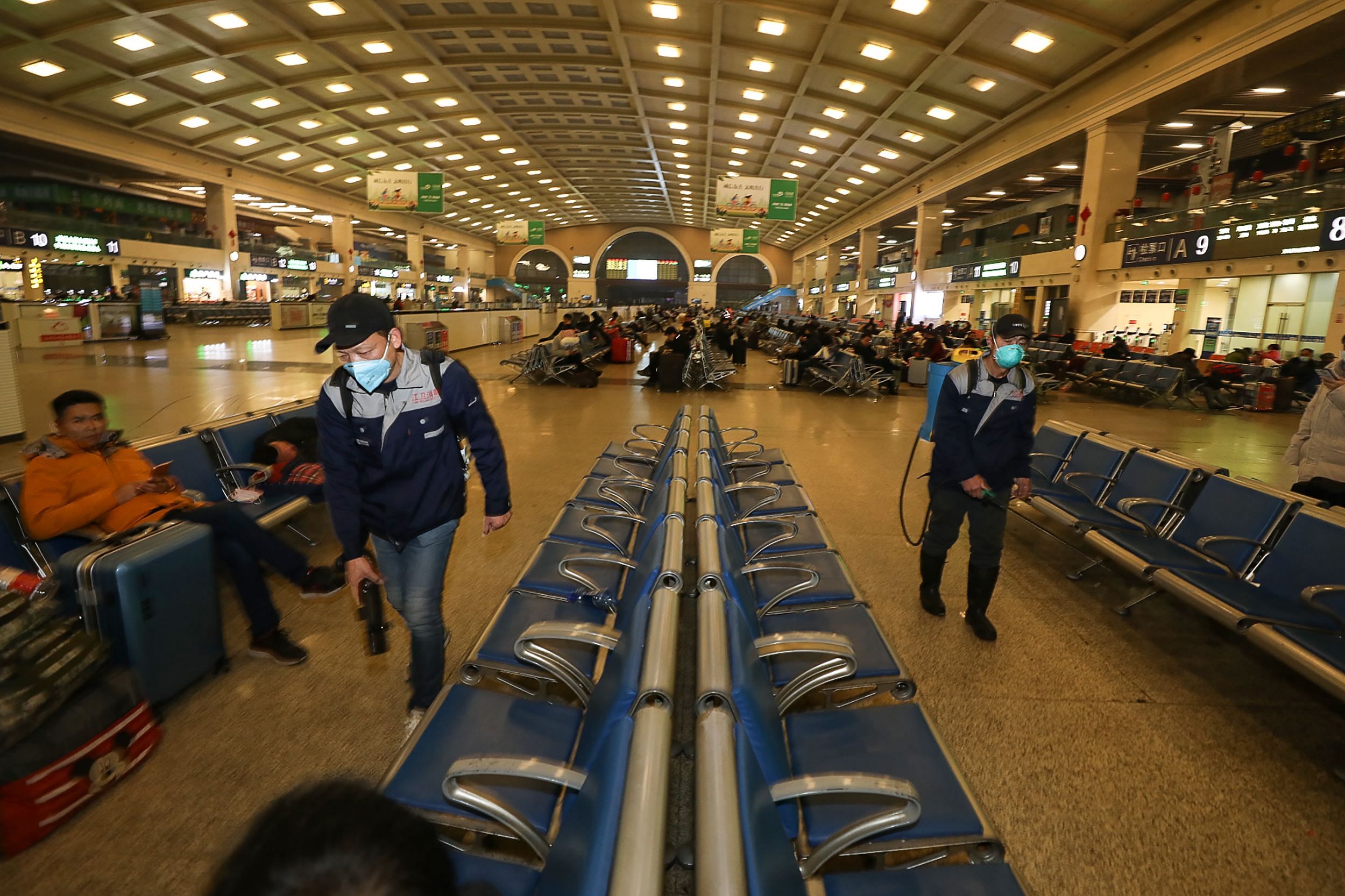China's new year nightmare: 3 billion trips and a virus
Sign up now: Get insights on Asia's fast-moving developments

A worker monitors screens for fever signs on passengers detected by infrared detectors at Hankou Railway Station in Wuhan on 21 Jan 2020.
PHOTO: EPA-EFE
BEIJING (BLOOMBERG) - The new respiratory virus sweeping China is hard to spot, potentially deadly and couldn't have broken out at a worse time.
This week marks the peak of the biggest human migration in the world, as hundreds of millions of Chinese travel for Chinese New Year festivities.
To reunite with family, they will spend long hours on cramped buses, overnight trains and airtight planes, sharing recirculated air - and germs - with hundreds of fellow travellers.
"The Spring Festival travel period is long and trains can be crowded. Some people are already sick and on the road so there might not be a very effective way to control them," said Professor Zhong Nanshan, a respiratory disease expert who led the research into a treatment for Sars, a similar viral outbreak that swept China in 2003.
It is hard to imagine a bigger challenge for public health workers in China and, as cases spread, around the world. In 2019, Chinese travellers made nearly three billion trips during the 40-day spring travel period, roughly comparable to 25 consecutive Thanksgiving travel nightmares.
To try to contain the contagion, airports, train stations and long-haul bus depots in China, as well as airports around the world, have installed temperature monitoring for travellers, though experts acknowledge that fever is only one symptom of the pneumonia-like virus.
In Wuhan, the centre of the outbreak, the authorities have taken more dramatic measures to keep 11 million residents - and a few unlucky tour groups - within the city limits.
In the past nine days, the government in Wuhan installed 35 infrared thermometers at the airport, train stations, long-haul bus stations and docks, and equipped workers with 300 handheld thermometers. Passengers with fevers were referred to local medical institutions; their tickets refunded or rescheduled.
Officials said on Wednesday that the city has been placed under heavy supervision, public gatherings through the holiday period have been cancelled, and tour groups have been banned from leaving.
Fears of contagion - and memories of Sars, which claimed 800 lives before it was contained - have coloured the joyful holiday with tension and paranoia.
"We want to go home, but we don't dare," said Mr Huang Ceyu, who works at an information technology company in Beijing. He and his wife cancelled their plans to take an overnight train to Wuhan, where his parents live, on Thursday (Jan 23).
"As an ordinary family, we don't know how to prevent this infection," he said. "There's no way for people to know if they have the virus or not. Even medical staff are infected. We worry that if my parents get infected, we won't know how to treat them."
Mr Huang returned their train tickets. The China State Railway Group has agreed to refund tickets to or from Wuhan. The government is encouraging airlines to do the same; Cathay Pacific and several domestic airlines have agreed to waive charges for passengers who want to reschedule or cancel travel there.
Outside of Wuhan, travellers seem relatively less anxious. At Shanghai's Hongqiao train station on Tuesday evening, there were few outward signs of an epidemic raging 840km to the west - no temperature checks or health warnings.
Right now, government officials acknowledge that it is far too early to say how bad the outbreak will be or how fast it will spread. Almost everyone, though, is thinking about the Sars epidemic. The government came under fire for downplaying the severity of the virus and letting it spread, unchecked, for far too long.
Beyond the sick, Sars affected almost every facet of Chinese life. Schools closed and students were sent home. People stopped travelling, going out to eat and shopping - public places became health risks.

Staff members disinfect at the Hankou Railway Station in Wuhan on Jan 22, 2020.
PHOTO: AFP
At the height of the outbreak, China's quarterly growth dropped by 2 percentage points, dragged down by transportation and hotels and catering. Retail sales growth sank to a historic low.
As of now, the current outbreak seems less lethal than Sars. Whether the effects are the same depends on how quickly it spreads and how long it lasts.
"If we use Sars as a reference, if the new pneumonia lasts a long time, it could lead to a drop in tourism," said Mr Tommy Xie, an economist at OCBC. "It will also affect the movie box office, restaurants and other consumption. The first quarter may be the hardest hit."
It's too early to say how serious the outbreak will be, but it's clear that anything that blunts consumption and travel will sting.
Travel to and from Wuhan will take a hit, but whether that spreads depends on how bad the virus situation gets, said Mr Zeng Fanzhe, a Beijing-based transport analyst at Tianfeng Securities.
The Chinese New Year is also one of China's most important movie-going seasons - last year, the seven-day stretch accounted for almost 10 per cent of annual ticket sales. Now, aware that moviegoers might be wary of confined spaces, some online ticketing platforms have promised unconditional refunds for those who have bought movie tickets in Wuhan.
Still, some travellers can't be persuaded to stay home. Wuhan native Bu Shi made his plans for an 11-day road trip down the California coast way back in September, and on Jan 21, he went to the airport. The terminal seemed quiet, and the airline employees who checked him in wore surgical masks. Before he could board his China Southern flight to San Francisco, he had to pass through a temperature checkpoint. There was another check for fever before boarding.
"I was a bit worried that I might be blocked from entering the States," he said. "My friend also joked that I could be repatriated the moment I land in America."
When his flight landed safely in San Fransisco, he got a bright yellow card from the Centres for Disease Control alerting passengers to the outbreak.
"If you have been in Wuhan within the past two weeks and develop a fever, cough or have difficulty breathing, seek medical care right away," it read.
Mr Huang, the IT worker who cancelled his trip home, considered briefly bringing his parents from Wuhan to celebrate with them in the capital. In the end, he decided it wasn't worth the risk.
"We weren't sure if they'd carry the virus to Beijing," he said. He bought them masks, and said their lives haven't actually been disrupted that much. "Sometimes the weather is the finest at the eye of the typhoon."


